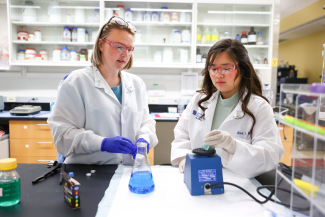By clicking on any of the sub-categories you will find a list of the faculty who have an active research project in that particular field, and can access more detailed information on those projects by clicking on the name of the individual faculty member.
phd program Scientific Tracks
Graduate students and postdoctoral scholars have the opportunity to study alongside world-class faculty and staff in a number of new and emerging areas of science. Investigators conduct front-line research in areas of pharmaceutics that range from identifying fundamental mechanisms of disease to designing and developing new drugs, to understanding the impact of policies on health care.
Funding for research projects in laboratories at the College of Pharmacy has more than doubled over the past five years and has generated discoveries and innovations that have brought international recognition.

The Tracks
Medicinal, Bioorganic & Computational Chemistry
The Medicinal, Bioorganic & Computational Chemistry track is focused on new protein and nucleic acid based therapies and natural product drug discovery platforms. This track is ideal for students with interests in synthetic and biosynthetic approaches for drug discovery, development of novel computational tools for drug design, and the evolution of biologics for specific therapies or drug delivery.
Pharmaceutical Chemistry and Engineering (Pharmaceutics)
The Pharmaceutical Chemistry and Engineering track focuses on drug formulation, development and delivery.
Areas of emphasis include:
- the application of physical, physical organic, and analytical chemistry to solve pharmaceutical problems,
- the design, development, and optimization of dosage forms for small and large molecules, and
- fundamental research into materials science and nanotechnology to advance drug delivery systems design.
Clinical and Experimental Therapeutics (CET)
The Clinical and Experimental Therapeutics program focuses on translational research – research that aims to improve health outcomes in all populations by translating discoveries made on the laboratory bench into practical therapies that can be applied at the patient bedside.
Pharmacology and Experimental Therapeutics (PET)
The Pharmacology and Experimental Therapeutics track focuses on the discovery of therapeutics for diseases and disorders that deeply impact our communities:
- neurological disorders like Epilepsy and Alzheimer’s disease
- cardiovascular disease
- cancers including gastrointestinal cancers and brain cancers, and
Topics related to infectious disease prevention including antibiotic and antiviral resistance.
Pharmaceutical Outcomes and Policy (POP)
The program will prepare students for careers in the pharmaceutical industry, managed care companies, governmental positions related to healthcare benefits, and academic positions focused on research related to pharmaceutical outcomes and policy. The program core is composed of courses in epidemiology, policy, and statistics relevant to the field of POP.
